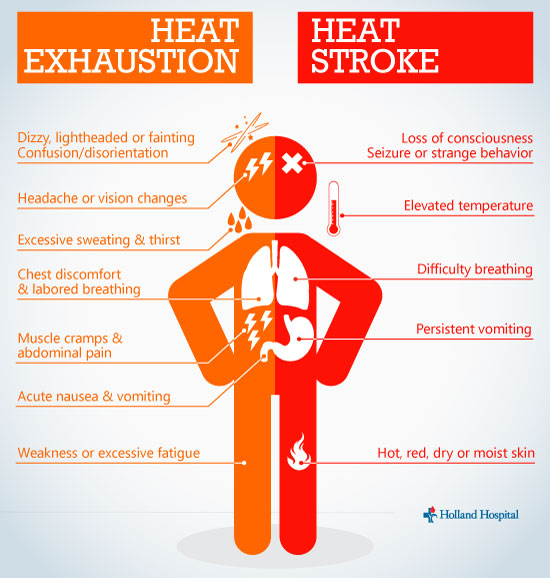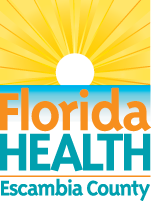STAY COOL AND PRACTICE SUN SAFETY DURING EXTREME HEAT CONDITIONS
July 29, 2021

Pensacola, Fla. – The National Weather Service (NWS) has recently issued a heat advisory for Escambia and surrounding counties. According to the NWS, a Heat Advisory means that a period of hot temperatures is expected with heat indices of 106 to 112 degrees. Hot temperature and high humidity will combine to create a situation in which heat illnesses are possible. It is important to remember to stay hydrated and protected against heat-related illness and the sun’s harmful ultraviolet (UV) rays.
The Florida Department of Health in Escambia County (FDOH-Escambia) is encouraging residents and visitors to practice sun safety during extreme heat conditions. Heat-related illness and deaths from extreme heat conditions are preventable. Heat stress can range from mild to severe. Milder conditions, like heat rash and heat exhaustion, are the most common, while the most serious heat-related illness is heat stroke. Heat stroke can cause death or permanent disability if medical treatment is not provided.
Individuals most vulnerable to heat-related illness are older adults, people with a chronic medical condition, those who work or exercise outdoors, and infants and children, but anyone subjected to high temperatures for an extended period of time can overheat.
Never leave children or pets unattended in vehicles, no matter how short the time period. Temperatures in vehicles heat up quickly, especially during the summer, and can become deadly in a matter of minutes.
Know the warning signs of heat-related illness:
- Extremely high body temperature (above 103°F);
- Weakness, dizziness, or fainting;
- Unusually elevated heart rate;
- Fast and shallow breathing;
- Nausea or vomiting;
- Muscle cramps.
Protect yourself with these helpful tips:
- Drink plenty of water; avoid sugary and alcoholic beverages;
- Wear lightweight, light-colored, loose-fitting clothing;
- Stay in air-conditioned buildings;
- Limit outdoor activity, especially in the afternoon during the hottest part of the day;
- Take cool showers or baths;
- Check your local news for heat warnings and safety tips.
Avoiding sunburn helps prevent both heat illness and skin cancer.
Sunburned and damaged skin does not release excess body heat as effectively as healthy skin. The sun’s UV rays can damage your skin in as little as 15 minutes, so it is important to protect your skin whenever you are outdoors. Since damage from exposure to UV rays builds up over time, sun protection should start at an early age, and skin should be protected all year. UV ray exposure is the most common cause of skin cancer and, skin cancer is the most common form of cancer in the United States. Sunburn and skin cancer risks can be reduced by following sun safety strategies that work.
Follow these simple tips to prevent sunburn:
- Seek shade, especially during 10 a.m. to 4 p.m. when the sun is the strongest;
- Wear sunglasses with UV protection, a hat, and sunscreen;
- Apply broad spectrum sunscreen with a sun protection factor (SPF) of at least 15;
- Reapply sunscreen every two hours and after swimming or sweating;
- Drink plenty of water to stay hydrated.
Remember to stay cool, hydrated, and informed this summer. For more information on extreme heat and heat-related illness prevention, visit http://emergency.cdc.gov/disasters/extremeheat/index.asp.
###
About the Florida Department of Health
The Florida Department of Health, nationally accredited by the Public Health Accreditation Board, works to protect, promote and improve the health of all people in Florida through integrated state, county and community efforts.
Follow us on Twitter at @HealthyEscambia and on Facebook. For more information about the Florida Department of Health please visit www.FloridaHealth.gov.




Connect with DOH